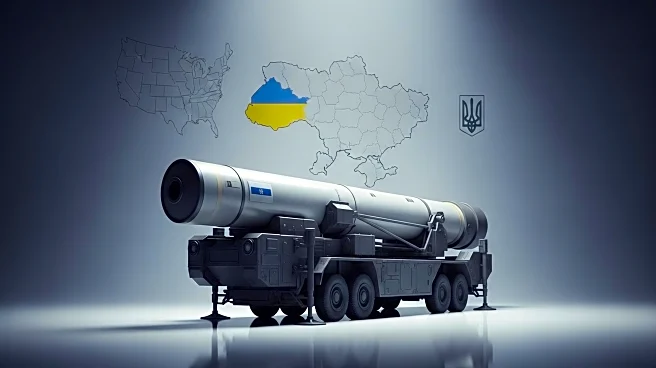What's Happening?
The Trump administration has announced a significant shift in its military aid strategy to Ukraine by providing 'deeper-strike capabilities' that could be used offensively. This development was confirmed by Matt Whitaker, the US Envoy to NATO, who emphasized the dual-track strategy combining military pressure with diplomatic engagement. The aid package includes the sale of 3,350 ERAM missiles, funded by Denmark, the Netherlands, and Norway, with a range of 240-450 km. This move raises questions about the relaxation of restrictions on Ukraine's use of American-made weapons against targets inside Russia. The announcement follows a major Russian aerial assault on Ukrainian cities, highlighting the ongoing conflict and the need for enhanced defense capabilities.
Why It's Important?
The provision of offensive capabilities to Ukraine marks a departure from previous U.S. policy, potentially altering the dynamics of the conflict with Russia. By enabling Ukraine to strike deeper into enemy territory, the U.S. aims to bolster Ukraine's defense while maintaining diplomatic channels open. This shift could impact U.S.-Russia relations and influence the broader geopolitical landscape, as it may provoke reactions from Russia and other international stakeholders. The aid also underscores the U.S.'s commitment to supporting Ukraine amidst stalled diplomatic efforts, potentially affecting future negotiations and peace talks.
What's Next?
The next steps involve monitoring the use of these capabilities by Ukraine and assessing the impact on the conflict's progression. Diplomatic efforts are expected to continue, with potential meetings between President Trump, Vladimir Putin, and Volodymyr Zelensky still in discussion. The U.S. administration may face pressure to further review restrictions on military aid, while balancing the need to keep Russia engaged in negotiations. Stakeholders, including NATO allies, will likely evaluate the implications of this policy shift on regional security and their own defense strategies.
Beyond the Headlines
The decision to provide offensive capabilities to Ukraine could have long-term implications for U.S. foreign policy and its role in NATO. It may influence the perception of U.S. leadership within the alliance and affect its strategic partnerships. Additionally, the move could trigger ethical debates regarding the escalation of military aid and its consequences on civilian populations in conflict zones. The broader impact on international arms sales and defense industry dynamics may also be significant, as countries reassess their military support policies.








